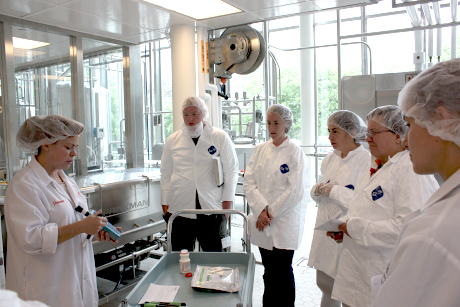Leading the whey: Cornell at forefront of dairy safety outreach
By Stacey Shackford and Ellen Leventry

Any way you slice it, brine it or age it, Cornell’s Food Science Dairy Extension Program faculty and professionals are helping New York cheesemakers and dairy producers provide safe, high-quality products for consumers.
“The College of Agriculture and Life Sciences and the Department of Food Science are committed to working with federal and state agencies and the food industry to generate appropriate scientific data for application by industry to produce safe food products, from the small artisanal scale to the large scale,” said Kathryn J. Boor, the Ronald P. Lynch Dean of the College of Agriculture and Life Sciences.
Case in point: Even as the program works closely with cheesemakers and the New York State Department of Agriculture and Markets to understand and address concerns about the United States Food and Drug Administration’s national policy regarding the use of wooden boards for cheese aging issued this week, it was hosting more than 40 local producers at a dairy food safety and basic dairy science workshop.
“The participants are being taught how to clean and sanitize different surfaces in food processing environments – exactly the skills that would be needed to implement consistent cleaning practices of wood boards, but also to clean and sanitize the overall facilities of any dairy processing and artisan cheesemaking operation,” said Martin Wiedmann, professor of food science and director of the Cornell Food Safety Lab.
Attendee Marjorie Randles of Randles Fairview Farm, in Argyle, N.Y., makers of Argyle Cheese Farmer cheese and yogurt products, has participated in three other workshops at Cornell.
“Our goal is to make a high-quality, healthy, safe product,” Randles said. “These workshops help me see areas where I need to improve, and where I should put new plans in place. Then, when I talk to an inspector, I speak their language and understand what they are talking about – they’ll have more confidence in me and I’ll have more confidence in myself that I’m going down the right path.”
Cornell also has intensified collaborative efforts with industry partners, including Wegmans Food Markets and 3M, to develop and implement procedures that dairy and other processing plants use to test their facilities’ environments for organisms that may cause human disease and determine response plans. A partnership with Wegmans, now in its second year, specifically provides funding to assist small artisanal cheesemakers develop and implement these types of testing procedures.
“In addition to the artisans in the Wegmans program, I work proactively with dozens and dozens of New York artisans to implement environmental testing programs and preventive control guidance and am in the process of helping them get this in place voluntarily,” said Rob Ralyea, senior dairy extension associate.
Moreover, Cornell provides technical advising and certification programs in cheesemaking, fluid milk processing, yogurt and fermented products to more than 500 dairy farmers, processors and industry professionals, and is collaborating with state and federal inspectors and regulators on training and recertification.
In order to keep expanding the safety net, the university is working with Sen. Charles Schumer (D-N.Y.), who visited the new Stocking Hall last summer, to position the Department of Food Science as a national center of excellence in dairy and food safety. Federal recognition would enable the university to leverage its expertise and extensive extension and training network to secure more funding for food safety research and to lead development of industrywide quality and safety standards.
“Cornell is a world leader in food safety, and I commend them for all of the work they do to help ensure New York’s dairy farmers and cheesemakers are leading the nation in quality and safety,” said Schumer. “I look forward to continuing to push for federal partnerships and grants that will help enhance Cornell’s work to grow New York’s dairy industry, which is a massive economic engine for the state.”
Stacey Shackford is a writer for the College of Agriculture and Life Sciences. Ellen Leventry is a media relations officer in CALS.
Media Contact
Get Cornell news delivered right to your inbox.
Subscribe